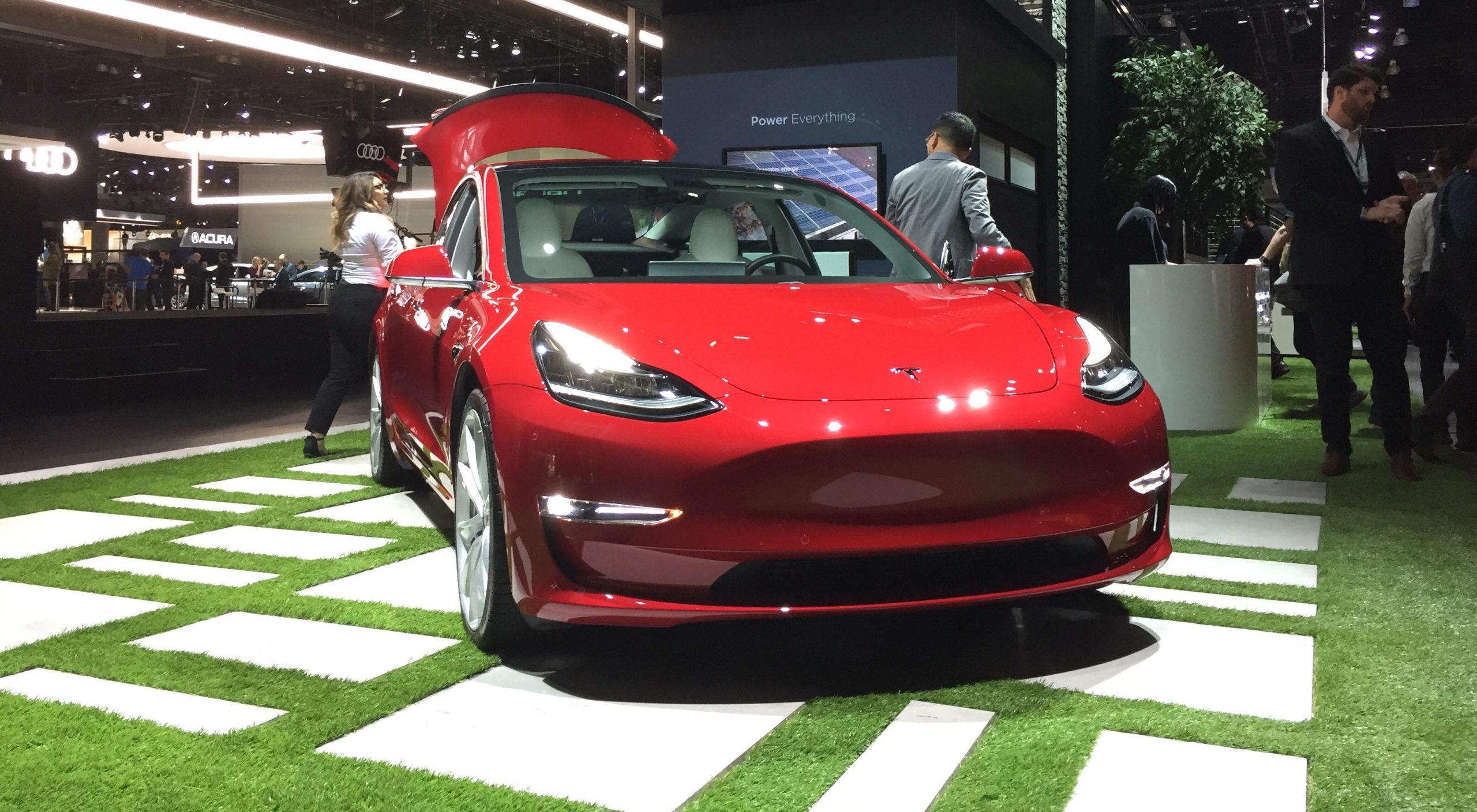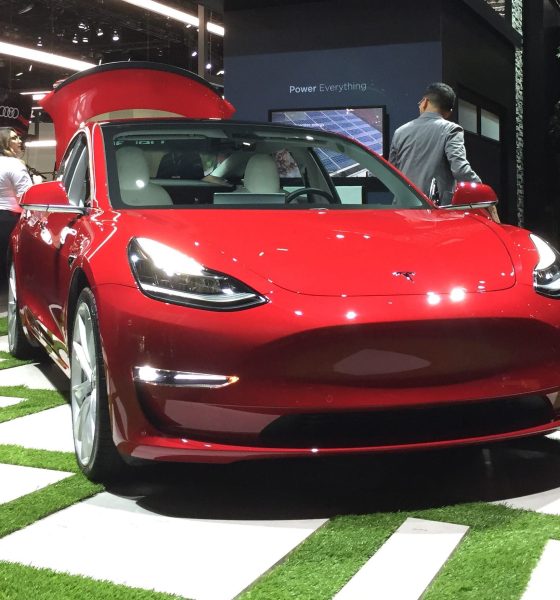

Investor's Corner
Tesla Model 3 recognized as the United States’ best-selling luxury car in 2018
The Tesla might still have a number of critics who question the vehicle’s demand, but the electric sedan has practically dominated in 2018 nonetheless. By selling a total of 145,846 units over the course of the past year, the Model 3 has established itself as the United States’ best-selling luxury vehicle, far outpacing its closest competitor.
After the Tesla Model 3, the second in the past year’s luxury vehicle rankings is the Lexus RX, which sold 111,641 units in 2018. Following the Toyota-made Lexus RX are more luxury SUVs from legacy carmakers from Germany, such as the Mercedes-Benz GLC, which sold 62,435 units, and the Audi Q5, which sold 61,835 over the year, as noted in a report from CNBC Make It.
The Model 3’s place at the top of the US’ luxury vehicles list is a notable feat for the electric sedan, especially considering Tesla’s challenges with the vehicle’s production ramp. In the first quarter of 2018, for example, Tesla was only able to produce 9,766 Model 3. During this time, Tesla was struggling to hit a milestone of producing 2,500 Model 3 per week.
After adopting unorthodox strategies such as the construction of another assembly line inside a massive sprung structure on the grounds of the Fremont factory, Tesla’s second quarter proved to be an improvement over Q1, with the company producing 28,578 Model 3 from April to June 2018. Q2 was also the first time production of the Model 3 exceeded the numbers of the Model S and X.
Tesla’s breakthrough with Model 3 production came in the third quarter when the company doubled its Q2 volume and produced 53,239 units of the vehicle. Despite what Elon Musk described as “delivery logistics hell,” Tesla was able to deliver a total of 55,840 Model 3 to customers before the quarter ended. These efforts ultimately allowed Tesla to surprise Wall Street and prove its naysayers wrong by posting $6.8 billion in revenue and beating earnings estimates with a GAAP profit of $312 million.
The Model 3 continued to be produced in mass quantities in the fourth quarter, with the company producing 61,394 Model 3. Deliveries for the vehicle also hit 63,150 in Q4, signifying a 13% growth over the vehicle’s already impressive figures in Q3 2018. Over the course of the year, Tesla ultimately delivered a total of 245,240 vehicles, 145,846 of them being the Model 3. That’s nearly as many cars the company sold in all previous years combined.
Inasmuch as the Model 3 is already being recognized as a success in the US luxury car market, the electric sedan is yet to start its push into international markets. So far, Tesla is already laying the foundations for the Model 3’s push in two large global markets — Europe and China. The company is reportedly looking to send 3,000 Model 3 per week to Europe by February. To prepare for the influx of Model 3, Tesla has begun rolling out Superchargers that are equipped with both a Type 2 and a CCS plug, which matches the port on Model 3 that are produced for the region.
Elon Musk has noted that deliveries of the Model 3 could begin as early as March in China. This, however, is but the tip of the iceberg for the company’s plans for the Model 3 in the country. Earlier this week, Elon Musk attended the groundbreaking event for Gigafactory 3, which will be tasked to produce affordable versions of the Model 3 and the Model Y for the Chinese market. In true Tesla fashion, the company has an aggressive timetable for the upcoming factory, with Musk stating that the first China-made Model 3 could roll out of Gigafactory 3 by the end of 2019.

Investor's Corner
Tesla gets tip of the hat from major Wall Street firm on self-driving prowess
“Tesla is at the forefront of autonomous driving, supported by a camera-only approach that is technically harder but much cheaper than the multi-sensor systems widely used in the industry. This strategy should allow Tesla to scale more profitably compared to Robotaxi competitors, helped by a growing data engine from its existing fleet,” BoA wrote.

Tesla received a tip of the hat from major Wall Street firm Bank of America on Wednesday, as it reinitiated coverage on Tesla shares with a bullish stance that comes with a ‘Buy’ rating and a $460 price target.
In a new note that marks a sharp reversal from its neutral position earlier in 2025, the bank declared Tesla’s Full Self-Driving (FSD) technology the “leading consumer autonomy solution.”
Analysts highlighted Tesla’s camera-only architecture, known as Tesla Vision, as a strategic masterstroke. While technically more challenging than the multi-sensor setups favored by rivals, the vision-based approach is dramatically cheaper to produce and maintain.
This cost edge, combined with Tesla’s rapidly expanding real-world data engine, positions the company to scale robotaxis far more profitably than competitors, BofA argues in the new note:
“Tesla is at the forefront of autonomous driving, supported by a camera-only approach that is technically harder but much cheaper than the multi-sensor systems widely used in the industry. This strategy should allow Tesla to scale more profitably compared to Robotaxi competitors, helped by a growing data engine from its existing fleet.”
The bank now attributes roughly 52% of Tesla’s total valuation to its Robotaxi ambitions. It also flagged meaningful upside from the Optimus humanoid robot program and the fast-growing energy storage business, suggesting the auto segment’s recent headwinds, including expired incentives, are being eclipsed by these higher-margin opportunities.
Tesla’s own data underscores exactly why Wall Street is waking up to FSD’s potential. According to Tesla’s official safety reporting page, the FSD Supervised fleet has now surpassed 8.4 billion cumulative miles driven.
Tesla FSD (Supervised) fleet passes 8.4 billion cumulative miles
That total ballooned from just 6 million miles in 2021 to 80 million in 2022, 670 million in 2023, 2.25 billion in 2024, and a staggering 4.25 billion in 2025 alone. In the first 50 days of 2026, owners added another 1 billion miles — averaging more than 20 million miles per day.
This avalanche of real-world, camera-captured footage, much of it on complex city streets, gives Tesla an unmatched training dataset. Every mile feeds its neural networks, accelerating improvement cycles that lidar-dependent rivals simply cannot match at scale.
Tesla owners themselves will tell you the suite gets better with every release, bringing new features and improvements to its self-driving project.
The $460 target implies roughly 15 percent upside from recent trading levels around $400. While regulatory and safety hurdles remain, BofA’s endorsement signals growing institutional conviction that Tesla’s data advantage is not hype; it’s a tangible moat already delivering billions of miles of proof.
Elon Musk
SpaceX IPO could push Elon Musk’s net worth past $1 trillion: Polymarket
The estimates were shared by the official Polymarket Money account on social media platform X.

Recent projections have outlined how a potential $1.75 trillion SpaceX IPO could generate historic returns for early investors. The projections suggest the offering would not only become the largest IPO in history but could also result in unprecedented windfalls for some of the company’s key investors.
The estimates were shared by the official Polymarket Money account on social media platform X.
As noted in a Polymarket Money analysis, Elon Musk invested $100 million into SpaceX in 2002 and currently owns approximately 42% of the company. At a $1.75 trillion valuation following SpaceX’s potential $1.75 trillion IPO, that stake would be worth roughly $735 billion.
Such a figure would dramatically expand Musk’s net worth. When combined with his holdings in Tesla Inc. and other ventures, a public debut at that level could position him as the world’s first trillionaire, depending on market conditions at the time of listing.
The Bloomberg Billionaires Index currently lists Elon Musk with a net worth of $666 billion, though a notable portion of this is tied to his TSLA stock. Tesla currently holds a market cap of $1.51 trillion, and Elon Musk’s currently holds about 13% to 15% of the company’s outstanding common stock.
Founders Fund, co-founded by Peter Thiel, invested $20 million in SpaceX in 2008. Polymarket Money estimates the firm owns between 1.5% and 3% of the private space company. At a $1.75 trillion valuation, that range would translate to approximately $26.25 billion to $52.5 billion in value.
That return would represent one of the most significant venture capital outcomes in modern Silicon Valley history, with a growth of 131,150% to 262,400%.
Alphabet Inc., Google’s parent company, invested $900 million into SpaceX in 2015 and is estimated to hold between 6% and 7% of the private space firm. At the projected IPO valuation, that stake could be worth between $105 billion and $122.5 billion. That’s a growth of 11,566% to 14,455%.
Other major backers highlighted in the post include Fidelity Investments, Baillie Gifford, Valor Equity Partners, Bank of America, and Andreessen Horowitz, each potentially sitting on multibillion-dollar gains.
Elon Musk
Elon Musk hints Tesla investors will be rewarded heavily
“Hold onto your Tesla stock. It’s going to be worth a lot, I think. That’s my bet,” Musk said.

Elon Musk recently hinted that he believes Tesla investors will be rewarded heavily if they continue to hold onto their shares, and he reiterated that in a new interview that the company released on its social accounts this week.
Musk is one of the most successful CEOs in the modern era and has mammothed competitors on the Forbes Net Worth List over the past year as his holdings in his various companies have continued to swell.
Tesla investors, especially those who have been holding shares for several years, have also felt substantial gains in their portfolios. Over the past five years, the stock is up over 78 percent. Since February 2019, nearly seven years ago to the day, the stock is up over 1,800 percent.
Musk said in the interview:
“Hold onto your Tesla stock. It’s going to be worth a lot, I think. That’s my bet.”
Elon Musk in new interview: “Hold on to your $TSLA stock. It’s going to be worth a lot, I think. That’s my bet.” pic.twitter.com/cucirBuhq0
— Sawyer Merritt (@SawyerMerritt) February 26, 2026
It’s no secret Musk has been extremely bullish on his own companies, but Tesla in particular, because it is publicly traded.
However, the company has so many amazing projects that have an opportunity to revolutionize their respective industries. There is certainly a path to major growth on Wall Street for Tesla through its various future projects, including Optimus, Cybercab, Semi, and Unsupervised FSD.
- Optimus (Tesla’s humanoid robot): Musk has discussed its potential for tasks like childcare, walking dogs, or assisting elderly parents, positioning it as a massive long-term driver of company value.
- Cybercab (Tesla’s robotaxi/autonomous ride-hailing vehicle): a fully autonomous vehicle geared specifically for Tesla’s ride-sharing ambitions.
- Semi (Tesla’s electric truck, with mentions of expansion, like in Europe): brings Tesla into the commercial logistics sector.
- Unsupervised FSD (Full Self-Driving software achieving full autonomy without human supervision): turns every Tesla owner’s vehicle into a fully-autonomous vehicle upon release
These projects specifically are some of the highest-growth pillars Tesla has ever attempted to develop, especially in Musk’s eyes, as he has said Optimus will be the best-selling product of all-time.
Many analysts agree, but the bullish ones, like Cathie Wood of ARK Invest, are perhaps the one who believes Tesla has incredible potential on Wall Street, predicting a $2,600 price target for 2030, but this is not even including Optimus.
She told Bloomberg last March that she believes that the project will present a potential additive if Tesla can scale faster than anticipated.








